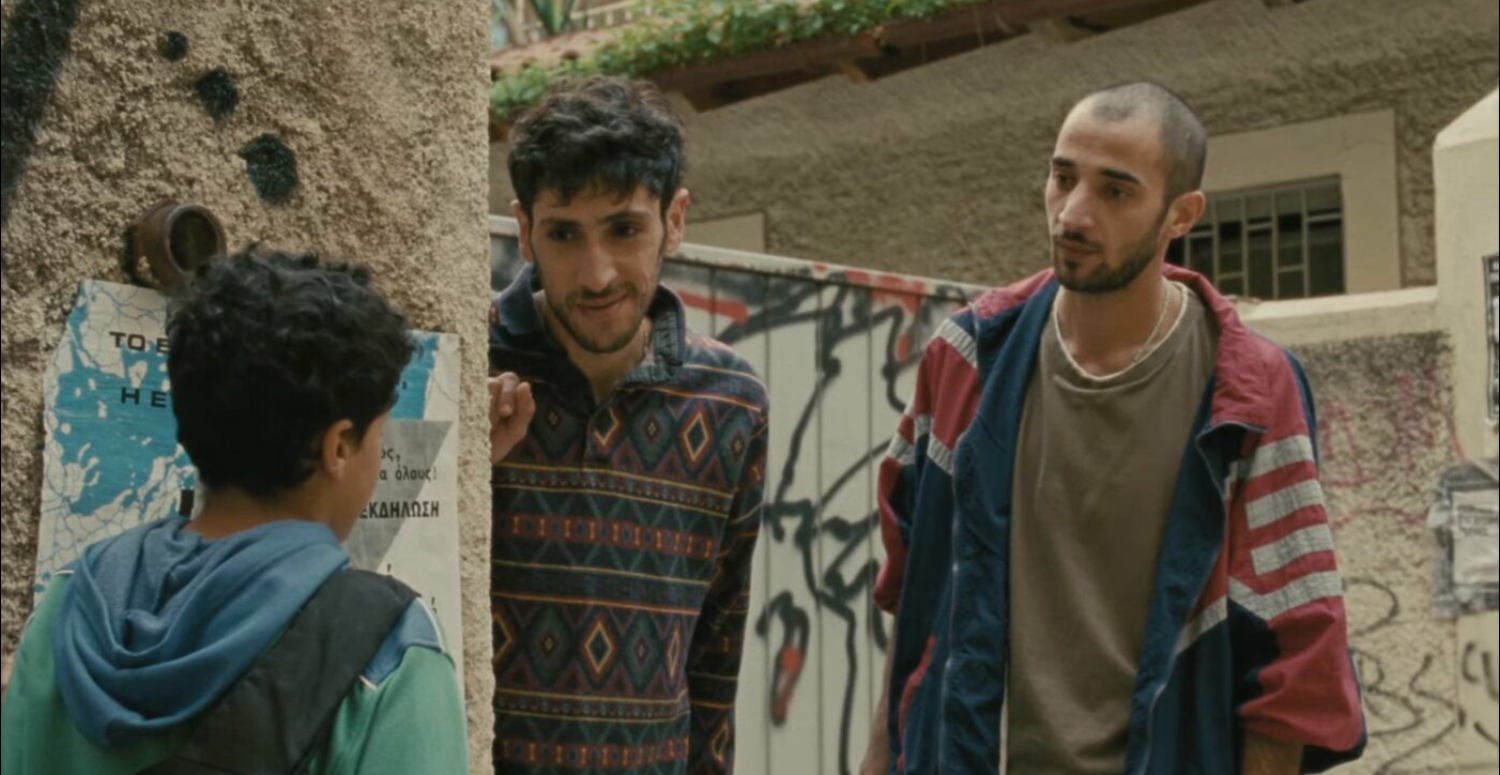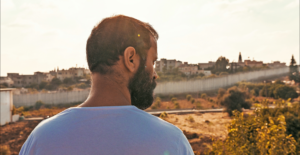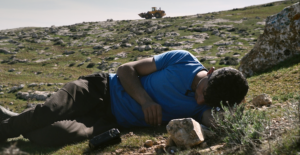Vers un pays inconnu
To a Land Unknown
2025

FR EN
« Le destin des Palestiniens est de ne pas finir là d’où ils viennent, mais dans un endroit inattendu et lointain », autrement dit, vers un pays inconnu … annonce dès l’ouverture du film la citation d’Edward Saïd. Si la Palestine est un peuple en guerre, c’est en fait une mosaïque de situations qui comprend notamment et depuis longtemps, l’exil. Dès les années 1960, les réfugiés palestiniens traversaient le désert pour essayer de trouver du travail au Koweit, aujourd’hui le nouveau désert urbain qu’il doivent franchir n’est autre que la Grèce ! Athènes s’impose alors comme un no man’s land oriental au sein de l’Europe, une zone de transit où cohabitent des hommes de tous pays dans des squats surpeuplés où la fraternité n’a plus sa place. La capitale grecque devient alors leur nouvelle prison d’où il faut s’enfuir …
Après un documentaire et plusieurs courts-métrages filmant l’exil au camp d’Ein el-Helweh, le réalisateur dano-palestinien (et diplômé à Londres) Mahdi Fleifel signe ici son premier long-métrage de fiction en nous embarquant dans l’histoire de deux cousins échoués à Athènes qui ont laissé ce qui leur restait d’attaches au Liban. Interdits de séjour chez eux et rejetés à l’étranger, ce sont des Palestiniens errants, sans papiers qui, dans leurs rêves les plus raisonnablement fous, espèrent partir en Allemagne pour y ouvrir un café. Pour cela ils économisent patiemment et échafaudent plan bancal sur plan bancal sur un chemin semé d’embûches. Convaincus qu’ils n’ont pas grand-chose à perdre, ils multiplient les tentatives frauduleuses jusqu’à ce qu’ils rencontrent un jeune gazaoui et une femme grecque les entraînant dans une arnaque plus dangereuse …
C’est une fiction à la frontière du documentaire qui emprunte au buddy movie et au thriller qui filme le déracinement et la douleur de l’attente qui nous demande comment survivre une fois dépouillés de tout : droits, citoyenneté, argent, ou dignité. C’est un film âpre décrivant les tréfonds de l’exil sans jamais juger ses personnages piégés moralement par leur situation d’exilés. Une situation faite d’accumulation d’impasses qui les pousse à franchir des limites, laissant une part d’eux-mêmes derrière eux. Et c’est bien le seul voyage qu’ils entreprennent car c’est une odyssée de l’immobile enchaînée à sa destinée de non-départ, ou comment rêver mille traversées en tentant tant bien que mal de pouvoir déjà partir. « Vers un pays inconnu » renvoie ainsi aussi bien à cet ailleurs hors-champ (potentiellement l’Allemagne), qu’à cet engrenage de la déshumanisation poussant des hommes ordinaires à s’exploiter entre compagnons de misère.
Tourné en pellicule 16mm à Athènes, « Vers un pays inconnu » nous marque par son ton et sa forme naturaliste, dont le grand réalisme est porté par un très bon duo de jeunes acteurs avec Mahmood Bakri qui se débat face à la culpabilité de ce qu’il est devenu et dont c’est le deuxième film, et Aram Sabbah, un skateur professionnel dont c’est le premier film, dans un rôle plus fragile et rêveur – tous deux incarnant deux facettes d’une même personne : le réfugié. Malgré quelques moments un peu trop longs et un élément de scénario trop nébuleux, c’est un beau film sur la jeunesse palestinienne éternellement prisonnière (Gaza, Liban, Grèce …) et condamnée à l’exil dans une spirale faite d’espoir et de désenchantement.
Raphaël Sallenave
“The destiny of the Palestinians is not to end up where they came from, but in an unexpected and distant place”, in other words, to a land unknown … as Edward Said’s quote heralds the opening of the film. If Palestine is a nation at war, it is actually a complex mosaic of situations, including, and for a long time now, exile. Back in the 1960s, Palestinian refugees crossed the desert to try and find work in Kuwait; today, the new urban desert they have to cross is none other than Greece! Athens has then become an eastern no-man’s-land in the heart of Europe, a transit area where people from all over the world live together in overcrowded squats where brotherhood no longer exists. The Greek capital thus becomes the new prison they must escape from…
After a documentary and several short films filming exile in the Ein el-Helweh camp, Danish-Palestinian (and London-educated) director Mahdi Fleifel directs his first feature film, taking us on a journey through the story of two cousins stranded in Athens, who have left what remains of their family ties in Lebanon. Banned at home and rejected abroad, they are undocumented wandering Palestinians who, in their wildest dreams, hope to move to Germany to open a café. To do so, they patiently save up and draw up wobbly plan after wobbly plan on a path strewn with pitfalls. Believing they have little to lose, they keep on making unscrupulous attempts, until they meet a young Gazan and a Greek woman, leading them into a more dangerous scam…
This is a fiction on the edge of documentary, borrowing from the buddy movie and the thriller genre, filming uprooting and the pain of longing, and asking how to survive once stripped of everything: rights, citizenship, money or dignity. It’s a harsh film, describing the depths of exile without ever judging its characters, morally trapped by their situation as exiles. A situation made up of an endless series of dead-ends that pushes them to cross limits, leaving a part of themselves behind. And it’s the only journey they undertake, for it’s an odyssey of the motionless, chained to its destiny of non-departure, or how to dream of a thousand journeys while trying, as best they can, to at least be able to leave. “To a Land Unknown” therefore refers both to this off-screen elsewhere (potentially Germany), and to the downward spiral of dehumanization that drives ordinary men to turn on one another as companions in misery.
Shot on 16mm film in Athens, “To a Land Unknown” stands out for its naturalistic tone and style, whose great realism is driven by an excellent duo of young actors, with Mahmood Bakri, who struggles with guilt over what he has become and whose second film this is, and Aram Sabbah, a professional skateboarder whose first film this is, in a more fragile, dreamy role – both embodying two faces of the same person: the refugee. Despite a few moments that are a little too long, and one plot point that is too unclear, this is a beautiful film about Palestinian youth eternally trapped (Gaza, Lebanon, Greece…) and doomed to exile in a spiral of hope and disillusionment.
Raphaël Sallenave

